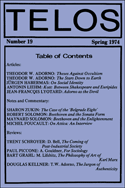As an occasional feature on TELOSscope, we highlight a past Telos article whose critical insights continue to illuminate our thinking and challenge our assumptions. Today, Sunil Kumar looks at Theodor W. Adorno’s “The Stars Down to Earth: The Los Angeles Times Astrology Column,” from Telos 19 (Spring 1974).
 “The Stars Down to Earth” is the content analysis of an astrology column that Adorno wrote during a return visit to the United States from Germany in 1952–53 and appeared in translation in Telos in 1974. The column under scrutiny called, “Astrological Forecasts,” was written by Carroll Righter and appeared in the Los Angeles Times, described by Adorno as a conservative newspaper, leaning far to the right wing of the Republican Party. He engages in a detailed analysis of the column between November 1952 and February 1953. His method is that of the systematic construction of the imagined readers of the column and a critique of the ideology that the column reinforces, that of accepting the social system as fate. Adorno hypothesizes that columns such as these mold to some extent the reader’s thinking and foster an element of blind acceptance. The impetus of the piece, as in “The Thesis against Occultism” (1947), is to highlight the tendency toward irrationality and authoritarianism in mid-twentieth-century Western culture. In the analysis of the column, this irrationality is reflected by the readers’ acceptance of the column’s absurd claim to be inspired by the stars, and the need to look for guidance and succor in the advice of an expert authority on mundane matters. The stars stand in for the reader of the column as a source of authority, and the belief in astrology represents for him or her a belief in a higher order—one that also appears to present to events a veneer of rationality to its opaque origin.
“The Stars Down to Earth” is the content analysis of an astrology column that Adorno wrote during a return visit to the United States from Germany in 1952–53 and appeared in translation in Telos in 1974. The column under scrutiny called, “Astrological Forecasts,” was written by Carroll Righter and appeared in the Los Angeles Times, described by Adorno as a conservative newspaper, leaning far to the right wing of the Republican Party. He engages in a detailed analysis of the column between November 1952 and February 1953. His method is that of the systematic construction of the imagined readers of the column and a critique of the ideology that the column reinforces, that of accepting the social system as fate. Adorno hypothesizes that columns such as these mold to some extent the reader’s thinking and foster an element of blind acceptance. The impetus of the piece, as in “The Thesis against Occultism” (1947), is to highlight the tendency toward irrationality and authoritarianism in mid-twentieth-century Western culture. In the analysis of the column, this irrationality is reflected by the readers’ acceptance of the column’s absurd claim to be inspired by the stars, and the need to look for guidance and succor in the advice of an expert authority on mundane matters. The stars stand in for the reader of the column as a source of authority, and the belief in astrology represents for him or her a belief in a higher order—one that also appears to present to events a veneer of rationality to its opaque origin.


